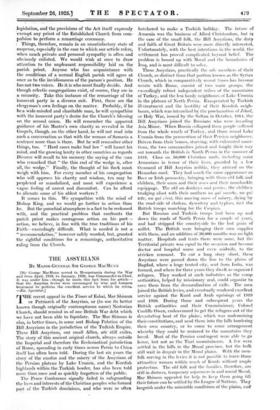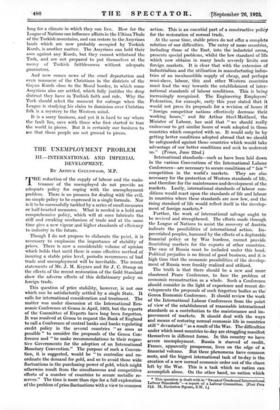THE ASSYRIANS BY MAJOR-GENERAL SIR GEORGE MACMITNN
[Sir George MaeMunn served in Mesopotamia during the War and from April, 1919, to January, 1920, was Commander-in-Chief. It was under him—though he omits this fact from his article— that the Assyrian levies were encouraged by wise and humane treatment to perform the excellent service to which he refers. —ED. Spectator.] gillE .recent appeal in the Times of Eshai, Mar Shimun .1. or Patriarch of the Assyrian, or (to use its better known though originally contemptuous name) Nestorian Church, should remind us of one British War debt which we have. not been able to liquidate. The Mar Shimun is also, in better times, in some sort Bishop Palatine of the Hill Assyrians in the jurisdiction of the Turkish Empire. These Hill Assyrians, our small Allies, aie still exiles. The story of this ancient original church, always outside the Imperial and therefore the Ecclesiastical jurisdiction of Rome, spreading in.early times across Persia to China itself has often been told. During the last six years the story of the exodus and the misery of the Assyrians of the Persian plateau by Lake Urumia, and the Kurdish highlands within the Turkish border, has also been told more than.once.and as quickly forgotten of the public.
The Peace Conference signally failed in safeguarding the lives andinterests of the Christian peoples who formed part of the Turkish dominions, and who were so often butchered to make a Turkish holiday. The future of Armenia was the business of Allied Christendom, but in the case of the small folk, the Hill Assyrians, the duty and faith of Great Britain were more directly interested. Unfortunately, with the best intentions in the world, the settlement has proved complicated beyond belief. The problem is bound up with Mosul and the boundaries of Iraq, and is most difficult to solve.
These Assyrians, practically the sole members of their Church, as distinct from that portion known as the Syrian Church, which in comparatively recent times has become uniate with Rome, consist of two main groups, the exceedingly robust independent 'tribes of the mountains of Turkey,, and the less hardy neighbours of Lake Urumia in the plateau of North Persia. Exasperated by Turkish ill-treatment and the hostility of their Kurdish neigh- bours, which was intensified by the proclamation of Jihad, or Holy War, issued by the Sultan in October, 1914, the Hill Assyrians joined the Russians who were invading Asia Minor. When Russia collapsed these people suffered from the whole wrath of Turkey, and those round Lake Urumia from the persecution of their Persian neighbours. Driven from their homes, starving, with exhausted muni- tions, the two communities joined and fought their way out towards the British in North Persia in the summer of 1918. Close on 50,000 Christian souls, including some Armenians in terror of their lives, guarded by a few thousand of Hill Assyrian militia, they arrived on the Hamadan road. They had much the same appearance as Boer or Irish peasantry, bringing with them old folk and children, their oxen and their asses and their ramshackle equippage. The old on donkeys and ponies, the children trudging afoot with their mothers an qui marche, un qui tette, tin qui vient, this moving mass of misery, dying by the road-side of cholera, dysentery and typhus, met the British troops marching for the Caspian.
But Russian and Turkish troops had been up and down the roads of North Persia for a couple of years, and had stripped the countryside to the last grain of millet. The British were bringing their own suppliei with them, and an addition of 50,000 mouths was no light matter. Hospitals and tents there were none, but the Territorial private was equal to the occasion and became doctor and hospital nurse and even midwife, to the stricken remnant. To cut a long story short, these Assyrians were passed down the line to the plains of Bagdad, where a huge tented city, sent from India, was formed, and where for three years they dwelt as organized refugees. They worked at such industries as the camp authorities, helped by missionary zeal, could organize to save them from the demoralization of exile. The men joined the British levies, and eventually rendered excellent service against the Kurd and Arab uprisings of 1919 and 1920. During those and subsequent years the British authorities and their Commissioner, Colonel Cunliffe Owen, endeavoured to get the refugees out of the devastating heat of the plains, which was underthining their constitutions, and send them into the hills bordering their own country, or to come to some arrangement whereby they could be restored to the mountains they loved. Most of the Persian contingent were able to go home, but not so the Tiari mountaineers. A few were settled in the hills in the Mosul province, but the bulk still wait in despair in the Mosul plains. With the men- folk serving in the levies it is not possible to leave those attractive women within reach of Kurds without ample protection. The old folk and the families, therefore, are still in distress, temporary sojourners in and round Mosul.. Mar Shimun appealed for help to keep them going till their future can be settled by the League of Nations. They languish under the miserable conditions of the plains, and' long for a climate in which they can live. How far the League of Nations can influence affairs in the Ultima Thule of the Turkish mountains, and can restore to the Assyrians lands which are now probably occupied by Turkish Kurds, is another matter. The Assyrians can hold their own against any Kurds, but they cannot withstand the Turk, and are not prepared to put themselves at the mercy of Turkish faithlessness without adequate guarantees.
And now comes news of the cruel deportation and even massacre of the Christians in the districts of the Goyan Kurds close to the Mosul border, in which some Assyrians also are settled, which fully justifies the deep distrust they have in Turkish faith and rule. Why the Turk should select the moment for outrage when the League is studying his claim to dominion over Christian folk is a mystery to the Western mind.
It is a sorry business, and yet it is hard to say where the fault lies, save with those who first started to tear the world in pieces. But it is certainly our business to see that these people are not ground to pieces.



















































 Previous page
Previous page